Photo: Al Pereira/Michael Ochs Archives/Getty Images
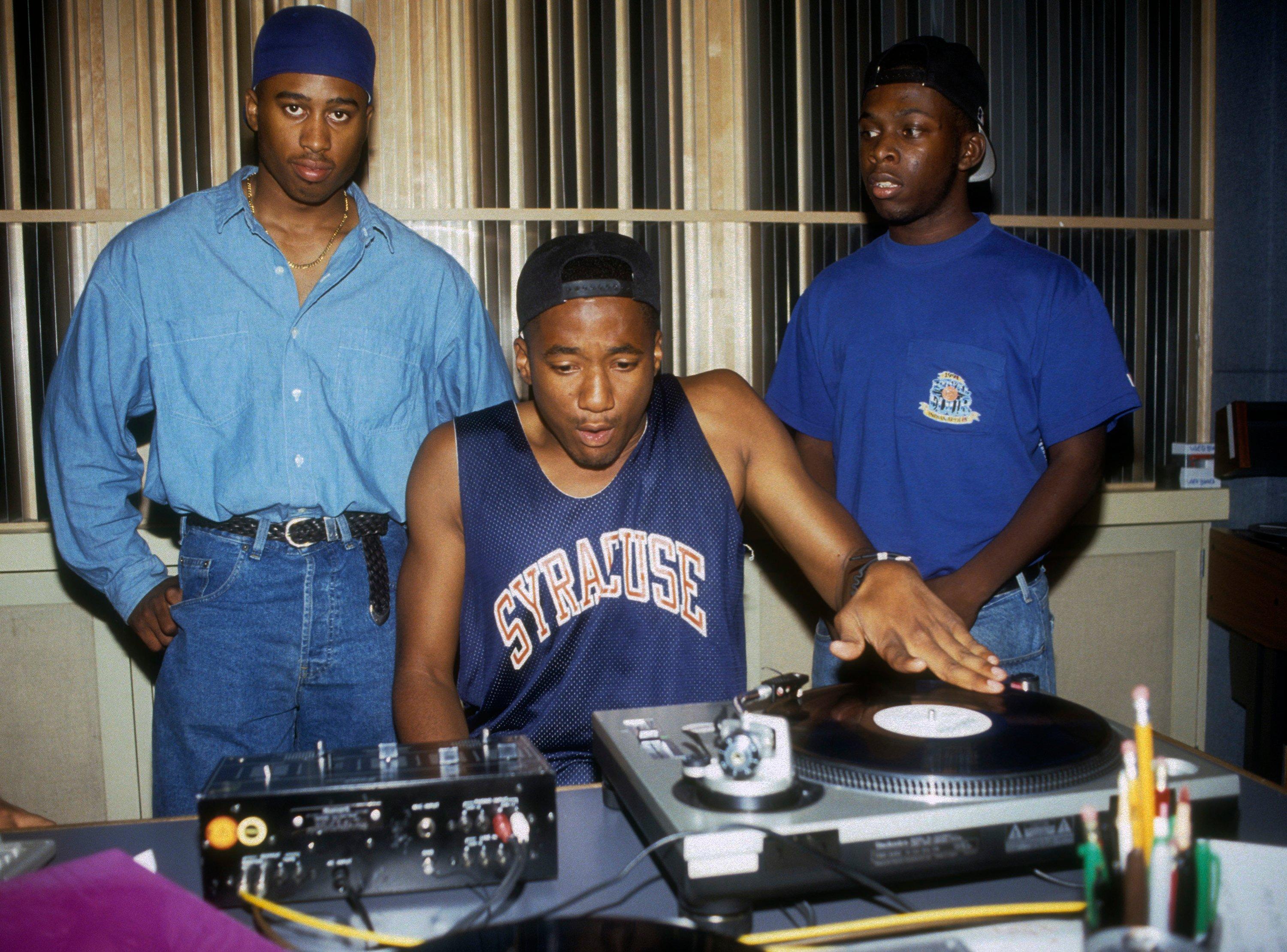
list
10 Albums That Showcase The Deep Connection Between Hip-Hop And Jazz: De La Soul, A Tribe Called Quest, Kendrick Lamar & More
Hip-hop and jazz are two branches of Black American music; their essences have always swirled together. Here are 10 albums that prove this.
Kassa Overall is tired of talking about the connections between jazz and rap. He had to do it when he released his last two albums, and he has to do it again regarding his latest one.
"They go together naturally," he once said. "They're from the same tree as far as where they come from, which is Black music in America. You don't have to over-mix them. It goes together already."
Expand this outward, and it applies to all Black American musics; it's not a stretch to connect gospel and blues, nor soul and R&B. Accordingly, jazz and rap contain much of the same DNA — from their rhythmic complexity to its improvisational component to its emphasis on the performer's personality.
Whether in sampling, the rhythmic backbone, or any number of other facets, jazz and rap have always been simpatico; just watch this video of the ‘40s and ‘50s vocal group the Jubilaries, which is billed as the “first rap song” and is currently circling TikTok. And as Overall points out to GRAMMY.com, even jazz greats like Louis Armstrong or Dizzy Gillespie had “Lil B and Danny Brown energy.”
From A Tribe Called Quest to the Roots to Kendrick Lamar, rap history is rife with classics that intertwine the languages of two Black American artforms. Here are 10 of them.
De La Soul — 3 Feet High and Rising (1989)
GRAMMY-winning Long Island legends De La Soul's catalog is finally on streaming; now's the perfect time to revisit these pivotal jazz-rap intersecters.
Featuring samples by everyone from Johnny Cash to Hall and Oates to the Turtles, their playful, iridescent, psychedelic 1989 debut, 3 Feet High and Rising, is the perfect portal to who Robert Christgau called "radically unlike any rap you or anybody else has ever heard,"
3 Feet High and Rising consistently ranks on lists of the greatest hip-hop albums of all time. In 2010, the Library of Congress added it to the National Recording Registry.
A Tribe Called Quest — The Low End Theory (1991)
If one were to itemize the most prodigious jazz-rap acts, four-time GRAMMY nominees A Tribe Called Quest belong near the top of the list. Their unforgettable tunes; intricate, genre-blending approach; and Afrocentric POV, put them at the forefront of jazz-rap.
There are several worthy gateways to the legendary discography of Q-Tip, Phife Dawg, Ali Shaheed Muhammad, and Jarobi White,, like 1993's Midnight Marauders and 1996's Beats, Rhymes and Life.
But their 1991 album The Low End Theory, was a consolidation and a watershed. From "Buggin' Out" to "Check the "Rhime" to "Scenario" — featuring Busta Rhymes, Charlie Brown and Dinco D — The Low End Theory contains the essence of Tribe’s vibrant, inventive personality.
Plus, it's not for nothing that they enlisted three-time GRAMMY winner Ron Carter to play on The Low End Theory; he's the most recorded jazz bassist in history.
Dream Warriors — And Now the Legacy Begins (1991)
Representing Canada are Dream Warriors, whose And Now the Legacy Begins was a landmark for alternative hip-hop.
King Lou and Capital Q's 1991 debut eschewed tough-guy posturing in favor of potent imagination and playful wit. Christgau nailed it once again with his characterization: "West Indian daisy age from boogie-down Toronto."
Its single "My Definition of a Boombastic Jazz Style" samples "Soul Bossa Nova" by 28-time GRAMMY winner Quincy Jones — who, among all the other components of his legacy, is one of jazz's finest arrangers. The tune would go on to become the Austin Powers theme song; in that regard, too, Dream Warriors were ahead of their time.
The Pharcyde — Bizarre Ride II the Pharcyde (1992)
All of Black American music was fair game to producer J-Swift; on the Pharcyde's classic debut Bizarre Ride II the Pharcyde, he sampled jazzers like Donald Byrd and Roy Ayers alongside Marvin Gaye, Jimi Hendrix, Sly and the Family Stone, and more. Over these beds of music, Fatlip, SlimKid 3, Imani, and Bootie Brown spit comedic bars with blue humor aplenty.
"I'm so slick that they need to call me, "Grease"/ 'Cause I slips and I slides When I rides on the beast" Imani raps in "Oh S—," in a representative moment. "Imani and your mom, sittin' in a tree/ K-I-S-S (I-N-G)."
All in all, the madcap, infectious Bizarre Ride II the Pharcyde is a pivotal entry in the jazz-rap pantheon. One reviewer put it best: "[It] reaffirms every positive stereotype you've ever heard about hip-hop while simultaneously exploding every negative myth."
Digable Planets — Reachin' (A New Refutation of Time and Space) (1993)
Digable Planets' Ishmael Butler once chalked up the prevalent jazz samples on their debut as such: "I just went and got the records that I had around me," he said. "And a lot of those were my dad's s—. which was lots of jazz." It fits Digable Planets like a glove.
"Rebirth of Slick (Cool Like Dat)" contains multiple elements of Art Blakey and the Jazz Messengers' "Stretching"; "Escapism (Gettin' Free" incorporates the hook from Herbie Hancock's "Watermelon Man"; and "It's Good to Be Here" samples Grant Green's "Samba de Orpheus. Throughout Reachin', Butler, Craig Irving and Mary Ann Viera proselytize Black liberation in a multiplicity of forms.
Pitchfork nailed it when it declared, "Reachin' is an album about freedom — from convention, from oppression, from the limits imposed by the space-time continuum."
Gang Starr — Daily Operation (1992)
In the realm of Gang Starr, spiritual consciousness and street poetry coalesce. Given that jazz trucks in both concepts, it's a natural ingredient for DJ Premier and Guru's finest work.
One of their first masterpieces, Daily Operation, contains some of jazz's greatest minds within its grooves. "The Place Where We Dwell" samples the Cannonball Adderley Quintet's "Fun"; Charles Mingus' "II B.S" is on "I'm the Man"; the late piano magician Ahmad Jamal's "Ghetto Child" pops up on "The Illest Brother."
Throughout their career, DJ Premier and Guru only honed their relaxed chemistry; jazz elements help give their music a natural swing and sway. (Their musical partnership continues to this day; Gang Starr is releasing music this very week.)
The Roots — Things Fall Apart (1999)
Three-time GRAMMY winners The Roots' genius blend of live instrumentation and conscious bars launched them far past any "jazz-rap" conversation and into mainstream culture, via their role as the house band on "The Tonight Show Starring Jimmy Fallon."
Elements of limbic, angular jazz can be found throughout their discography, but their major label debut Do You Want More?!!!??! might be the most effective entryway into their blend of jazz and rap. ("Silent Treatment" features a bona fide jazz singer as a guest, Cassandra Wilson.)
Whether it’s the burbling "Distortion to Static," or the jazz-fusion-y "I Remain Calm," or the knockabout "Essaywhuman?!!!??!", venture forth into the Roots' discography; they're a hub of so many spokes of Black American music.
Madlib — Shades of Blue (2003)
As jazz-rap connections go, Madlib's Shades of Blue is one of the most pointed and direct.
Therein, he raids the Blue Note Records vault and remixes luminaries from Wayne Shorter ("Footprints") to Bobby Hutcherson ("Montara") to Ronnie Foster ("Mystic Brew," flipped into "Mystic Bounce"). In the medley "Peace/Dolphin Dance," Horace Silver and Herbie Hencock's titular works meet in the ether.
Elsewhere, Shades of Blue offers new interpretations of Blue Note classics by Madlib's fictional ensembles Yesterday's New Quintet, Morgan Adams Quartet Plus Two, Sound Direction, and the Joe McDuphrey Experience — all of whom are just Madlib playing every instrument.
In recent years, Blue Note has been hurtling forward with a slew of inspired new signings — some veterans, some newcomers. Through that lens, Shades of Blue provides a kaleidoscopic view of the storied jazz repository's past while paving the way for its future.
Kendrick Lamar — To Pimp a Butterfly (2015)
Lamar's game-changing third album featured a mighty cross-section of the most cutting-edge jazz musicians of its day, from Robert Glasper to Kamasi Washington.
While hip-hop has had a direct line to jazz for decades — as evidenced by previous entries on this list — Lamar solidified and codified it for the 21st century in this sequence of teeming, ambitious songs about Black culture, mental health and institutional racism.
"Kendrick reached a certain level with his rap that allowed him to move like a horn player," Overall told Tidal in 2020. And regarding Lamar’s present and future jazz-rap comminglings, Overall adds, "He opened up the floodgates of creative possibilities."
Kassa Overall — Animals (2023)
The pieces of Overall's brilliance have been there from the beginning, but never had he combined them to more thrilling effect than on Animals — where jazz musicians like pianists Kris Davis and Vijay Iyer commingle with rappers like Danny Brown and Lil B.
"I would rather people hear my music and not think it's a jazz-rap collage," Overall once told GRAMMY.com. "What if you don't relate it to anything else? What does it sound like to you?"
When it comes to the gonzo Danny Brown and Wiki collaboration "Clock Ticking," the Theo Croker-assisted "The Lava is Calm," and the inspired meltdown of "Going Up," featuring Lil B, Shabazz Palaces and Francis & the Lights — this music sounds like nothing else.
Over the decades, Black American musicians have swirled together jazz and rap into a cyclone of innovation, heart and brilliance — and there’s seemingly no limit to the iterations it can take on.
Kassa Overall Breaks The Mold And Embraces Absurdity On New Album Animals
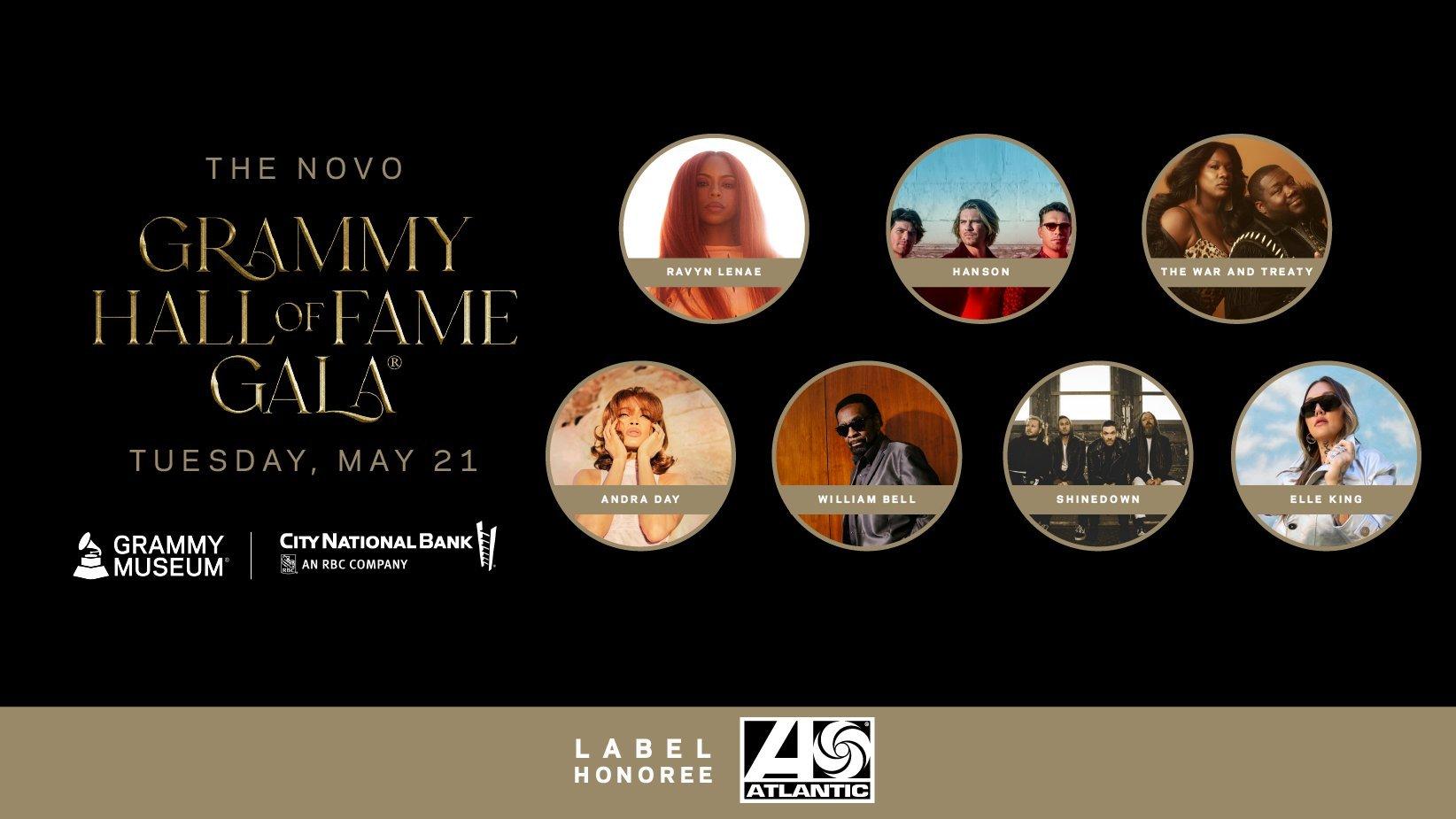
Photos: Courtesy of the artists
news
William Bell, HANSON, Elle King & More Added To The Lineup Of Performers At The Inaugural Grammy Hall Of Fame Gala On May 21
These artists will join Andra Day, Ravyn Lenae, Shinedown and The War and Treaty to perform in honor of inducted recordings by De La Soul, Guns N' Roses, Donna Summer and more on the 50th Anniversary of the GRAMMY Hall Of Fame.
William Bell, HANSON and Elle King have been added to the lineup for the Recording Academy and GRAMMY Museum's inaugural GRAMMY Hall Of Fame Gala, taking place on May 21, at The Novo in Downtown Los Angeles.
Previously announced performers include Andra Day, Ravyn Lenae, Shinedown and The War and Treaty. The evening will include a red carpet and VIP reception on the Ray Charles Terrace at the GRAMMY Museum followed by a one-of-a-kind concert at The Novo. The Gala will also pay tribute to iconic record label Atlantic Records. The evening will be hosted by veteran CBS broadcast journalist Anthony Mason, who will be joined by Michael Sticka, President/CEO of the GRAMMY Museum, Harvey Mason jr., CEO of the Recording Academy, and Julie Greenwald, chairperson and CEO of Atlantic Records Group.
Performers will pay tribute to the 2024 GRAMMY Hall Of Fame inducted recordings. Andra Day will perform a song from Lauryn Hill's The Miseducation Of Lauryn Hill; William Bell will perform his song "You Don't Miss Your Water"; The War and Treaty will perform Charley Pride's "Kiss An Angel Good Morning"; Elle King will perform Wanda Jackson's "Let's Have A Party." HANSON will perform the Doobie Brothers' "What A Fool Believes"; Ravyn Lenae will perform Roberta Flack's "Killing Me Softly;" and Shinedown will perform Led Zeppelin's "Stairway To Heaven." Tickets are on sale to the general public and more information about the GRAMMY Hall Of Fame Gala is available on the website.
The inaugural Hall Of Fame Gala will honor the 2024 GRAMMY Hall Of Fame inducted recordings on its 50th Anniversary, including De La Soul's 3 Feet High And Rising, Guns N' Roses' Appetite For Destruction, Buena Vista Social Club's Buena Vista Social Club, and Lauryn Hill's The Miseducation Of Lauryn Hill, as well as recordings by Donna Summer, Charley Pride, Wanda Jackson, Kid Ory's Creole Orchestra, the Doobie Brothers, and William Bell.
This year's show will be produced by longtime Executive Producer of the GRAMMY Awards, Ken Ehrlich, along with Chantel Sausedo and Ron Basile. Musical Direction by globally renowned producer and keyboardist Greg Phillinganes. The Gala is presented by City National Bank.
An online auction is currently underway alongside the Hall Of Fame Gala, featuring a vast collection of guitars signed by an array of major artists including Taylor Swift, Dua Lipa, Billie Eilish, Olivia Rodrigo, Joni Mitchell, Billy Joel, and many others, as well as Platinum tickets to the 2025 GRAMMY Awards and more. Proceeds will benefit the GRAMMY Museum. Click HERE for more info.
The GRAMMY Hall Of Fame was established by the Recording Academy's National Trustees in 1973. The inducted recordings are selected annually by a special member committee of eminent and knowledgeable professionals from all branches of the recording arts with final ratification by the Recording Academy's National Board of Trustees. With 10 new titles, the Hall currently totals 1,152 inducted recordings in the GRAMMY Hall Of Fame. Recipients will receive an official certificate from the Recording Academy and GRAMMY Museum. See the full list of past inducted recordings here.
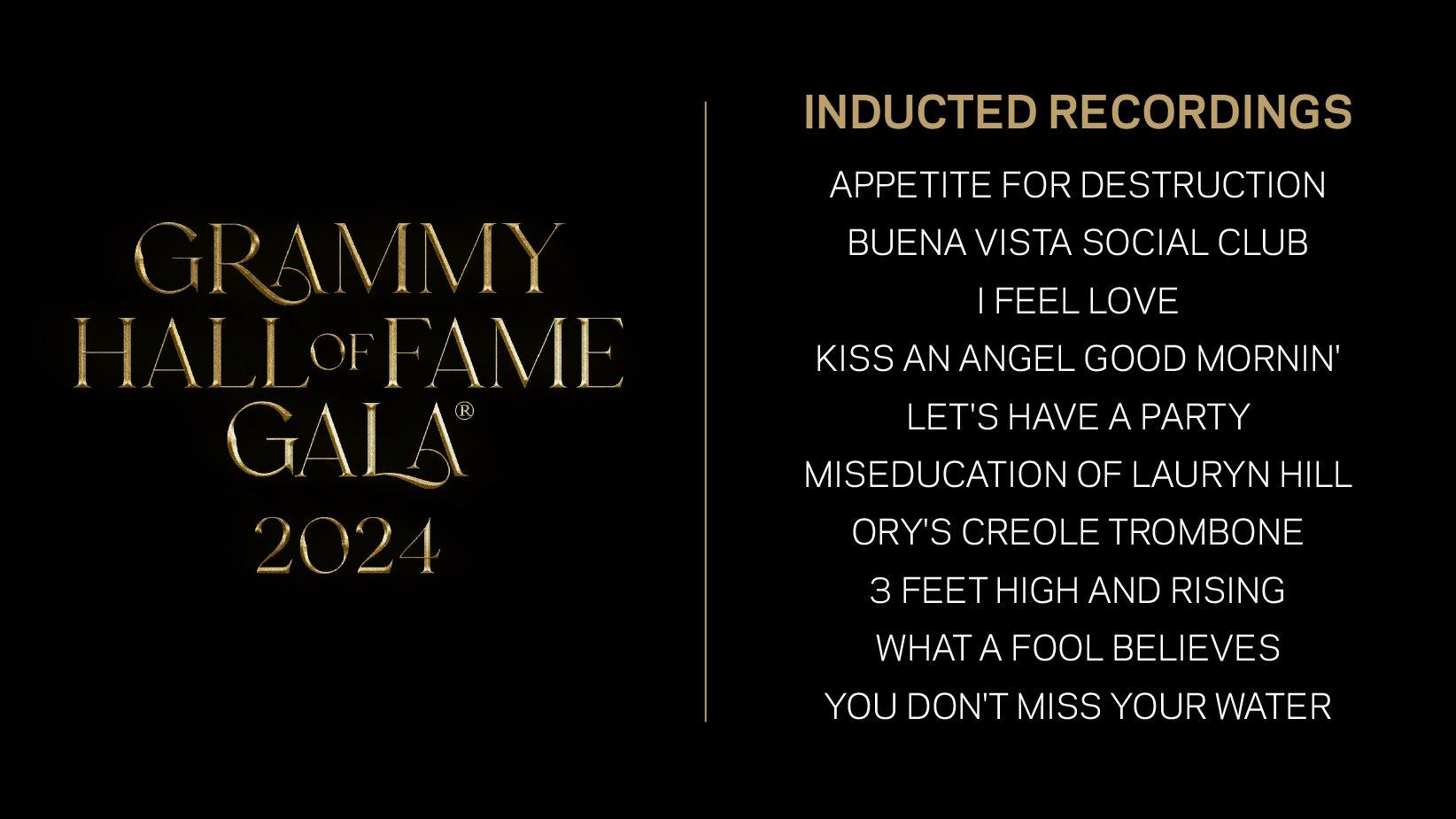
Image courtesy of the GRAMMY Museum
news
GRAMMY Hall Of Fame 2024 Inductees Announced: Recordings By Lauryn Hill, Guns N' Roses, Donna Summer, De La Soul & More
The GRAMMY Museum's inaugural GRAMMY Hall Of Fame Gala and concert, presented by City National Bank, takes place Tuesday, May 21, at the NOVO Theater in Los Angeles.
The Recording Academy has announced 10 recordings to be newly inducted to the distinguished GRAMMY Hall Of Fame as part of its 2024 inductee class and in celebration of its 50th anniversary this year. This year's GRAMMY Hall of Fame additions, the first inductions since 2021, include four albums and six singles that exhibit qualitative or historical significance and are at least 25 years old. The inducted recordings, which will be added to the iconic catalog residing at the GRAMMY Museum, will be honored at GRAMMY Museum's inaugural GRAMMY Hall Of Fame Gala and concert, presented by City National Bank, taking place Tuesday, May 21, at the NOVO Theater in Los Angeles. Tickets for and performers at the Gala will be announced at a later date.
The 2024 GRAMMY Hall Of Fame inducted recordings range from Lauryn Hill's The Miseducation of Lauryn Hill to Guns N' Roses' Appetite For Destruction. Others include recordings by De La Soul, Buena Vista Social Club, Donna Summer, Charley Pride, Wanda Jackson, Kid Ory's Creole Orchestra, the Doobie Brothers, and William Bell. Eligible recipients will receive an official certificate from the Recording Academy. With these 10 newly inducted titles, the GRAMMY Hall Of Fame currently totals 1,152 inducted recordings.
See below for a full list of the 2024 recordings inducted into the GRAMMY Hall Of Fame, and see the full list of all past GRAMMY Hall Of Fame inducted recordings.
Full list of 2024 GRAMMY Hall Of Fame Inducted Recordings:
3 FEET HIGH AND RISING
De La Soul
Tommy Boy (1989)
(Album)
Inducted: 2024
APPETITE FOR DESTRUCTION
Guns N' Roses
Geffen (1987)
(Album)
Inducted: 2024
BUENA VISTA SOCIAL CLUB
Buena Vista Social Club
World Circuit/Nonesuch (1997)
(Album)
Inducted: 2024
“I FEEL LOVE”
Donna Summer
Casablanca (1977)
(Single)
Inducted: 2024
“KISS AN ANGEL GOOD MORNIN'“
Charley Pride
RCA Victor (1971)
(Single)
Inducted: 2024
“LET'S HAVE A PARTY”
Wanda Jackson
Capitol (1960)
(Single)
Inducted: 2024
THE MISEDUCATION OF LAURYN HILL
Lauryn Hill
Ruffhouse/Columbia (1998)
(Album)
Inducted: 2024
“ORY'S CREOLE TROMBONE”
Kid Ory's Creole Orchestra (As Spike's Seven Pods of Pepper Orchestra)
Nordskog (1922)
(Single)
2024
“WHAT A FOOL BELIEVES”
The Doobie Brothers
Warner Bros. (1978)
(Single)
Inducted: 2024
“YOU DON'T MISS YOUR WATER”
William Bell
Stax (1961)
(Single)
Inducted: 2024
Explore The 2024 GRAMMY Hall Of Fame Inductees
Revisiting 'The Miseducation Of Lauryn Hill': Why The Multiple GRAMMY-Winning Record Is Still Everything 25 Years Later
Remembering De La Soul’s David Jolicoeur, a.k.a. Dave and Trugoy the Dove: 5 Essential Tracks
Guns N' Roses 'Appetite For Destruction' | For The Record
An Ode To Donna Summer's 1970s: How The Disco Queen Embodied Both Innovator And Vixen
Essential Hip-Hop Releases From The 1980s: Slick Rick, RUN-D.M.C., De La Soul & More
For Charley Pride, Black Country Music Was A Self-Evident Truth
Beyoncé To Alison Krauss: 10 Times Women Made GRAMMY History
Love To Love Them, Baby: From Donna Summer To Dua Lipa, Meet The Women Singers Who Shaped (And Continue to Shape) Dance Music
10 Albums That Showcase The Deep Connection Between Hip-Hop And Jazz: De La Soul, A Tribe Called Quest, Kendrick Lamar & More
'The Miseducation Of Lauryn Hill': 25 Facts About The Iconic Album, From Its Cover To Its Controversy

Watch Kenny Loggins And Michael McDonald Take Home A GRAMMY For Song Of The Year For "What A Fool Believes" | GRAMMY Rewind
A History Of Casablanca Records In 10 Songs, From Kiss To Donna Summer To Lindsay Lohan
1968: A Year Of Change For The World, Memphis & Stax Records

Lauryn Hill's 'The Miseducation Of Lauryn Hill' | For The Record
"We're proud to unveil the diverse mix of recordings entering the GRAMMY Hall Of Fame in its 50th year," Recording Academy CEO Harvey Mason jr. said in a statement. "The music showcased here has played a pivotal role in shaping our cultural landscape, and it's a true honor to recognize these albums and recordings, along with the profound influence each has had on music and beyond."
"The artists, songwriters, producers, and engineers who composed this year's inducted recordings are a reflection of the sheer talent and hard work that goes into creating such seminal music," GRAMMY Museum President/CEO Michael Sticka said in a statement. "It's a privilege to be able to welcome these new additions into our distinguished catalog and celebrate the recordings at our inaugural gala on May 21."
The GRAMMY Hall Of Fame was established by the Recording Academy's National Trustees in 1973. The inducted recordings are selected annually by a special member committee of eminent and knowledgeable professionals from all branches of the recording arts with final ratification by the Recording Academy's National Board of Trustees.
This year, the GRAMMY Hall Of Fame Gala will be the first of what will become an annual event and includes a red carpet and VIP reception on the newly opened Ray Charles Terrace at the GRAMMY Museum, followed by a one-of-a-kind concert at the NOVO Theater in downtown Los Angeles.
The inaugural gala and concert is produced by longtime executive producer of the GRAMMY Awards, Ken Ehrlich, along with Chantel Sausedo and Ron Basile and will feature musical direction by globally renowned producer and keyboardist Greg Phillinganes. For sponsorship opportunities, reach out to halloffame@grammymuseum.org.
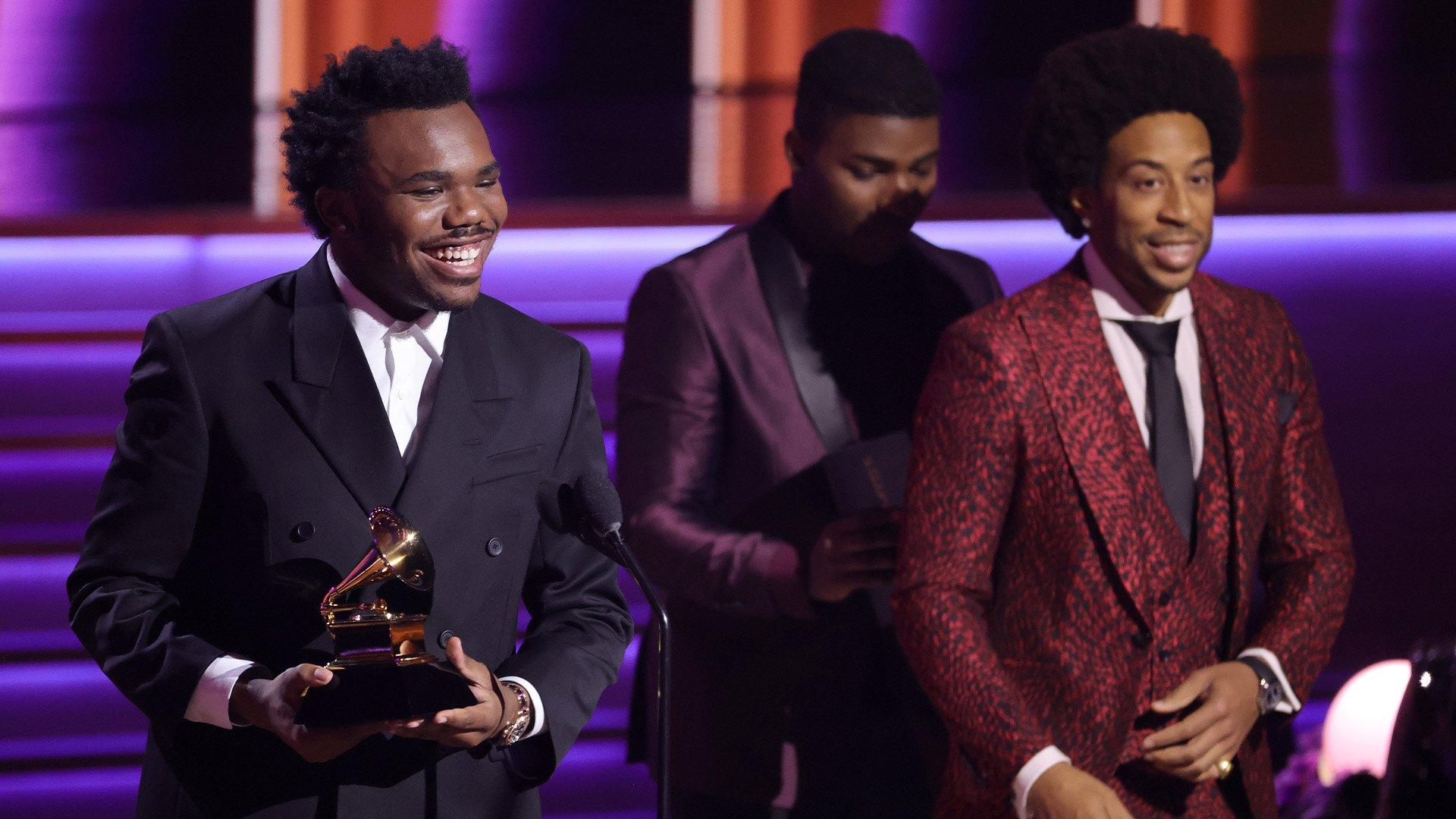
Photo: Matt Winkelmeyer/Getty Images
video
GRAMMY Rewind: Watch Baby Keem Celebrate "Family Ties" During Best Rap Performance Win In 2022
Revisit the moment budding rapper Baby Keem won his first-ever gramophone for Best Rap Performance at the 2022 GRAMMY Awards for his Kendrick Lamar collab "Family Ties."
For Baby Keem and Kendrick Lamar, The Melodic Blue was a family affair. The two cousins collaborated on three tracks from Keem's 2021 debut LP, "Range Brothers," "Vent," and "Family Ties." And in 2022, the latter helped the pair celebrate a GRAMMY victory.
In this episode of GRAMMY Rewind, turn the clock back to the night Baby Keem accepted Best Rap Performance for "Family Ties," marking the first GRAMMY win of his career.
"Wow, nothing could prepare me for this moment," Baby Keem said at the start of his speech.
He began listing praise for his "supporting system," including his family and "the women that raised me and shaped me to become the man I am."
Before heading off the stage, he acknowledged his team, who "helped shape everything we have going on behind the scenes," including Lamar. "Thank you everybody. This is a dream."
Baby Keem received four nominations in total at the 2022 GRAMMYs. He was also up for Best New Artist, Best Rap Song, and Album Of The Year as a featured artist on Kanye West's Donda.
Press play on the video above to watch Baby Keem's complete acceptance speech for Best Rap Performance at the 2022 GRAMMYs, and check back to GRAMMY.com for more new episodes of GRAMMY Rewind.
How The 2024 GRAMMYs Saw The Return Of Music Heroes & Birthed New Icons
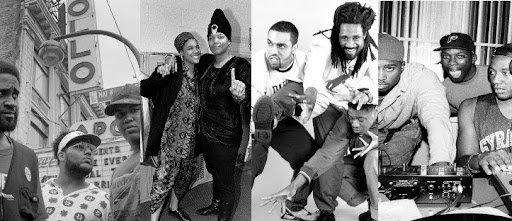
Photos: David Corio/Redferns; Raymond Boyd/Getty Images; Al Pereira/Michael Ochs Archives/Getty Images
feature
How Native Tongues Expanded Hip-Hop With Eclectic Sounds & Vision
In the late '80s and early '90s, the New York-based collective Native Tongues encouraged hip-hop to expand and shift. Their attitude had a significant impact on hip-hop and, later, mainstream pop.
When people fondly refer back to hip-hop’s golden age, they are talking about hip-hop’s adolescence — an experimental era when no idea was too risky, no innovation too bold, no boundary too established to be broken. This period between the mid 1980s and mid '90s saw hip-hop’s elders transported into new directions as the culture transitioned into the capitalist mainstream.
It is impossible to document this golden era without acknowledging the contributions of the Native Tongues. The New York-based collective — whose core members included now household names such as the Jungle Brothers, A Tribe Called Quest, Queen Latifah, De La Soul and Monie Love — played a pivotal role in reshaping the cultural landscape of both hip-hop and jazz in the mainstream. As a whole, the Native Tongues opted for a more introspective and bohemian approach to their lyricism and melodies.
The Jungle Brothers’ Mike Gee, DJ Sammy B and Baby Bam led the wave with an Afrocentric philosophy. Their 1988 debut album Straight Out the Jungle, set the vanguard of fusing hip-hop with jazz elements. "Black is Black" is perfectly representative of the first tendrils of what would become the canonical Native Tongues sound: an almost whimsical approach to with race relations and social commentary in America, structured with a boom-bap drums and an impressive array of samples (Gil-Scott Heron, Prince, Kool & The Gang). At the opening beats, Q-Tip introduces himself, going "I’m from A Tribe Called Quest" — a harbinger of the yearslong future association as part of the most influential young collectives of the '90s.
Q-Tip and Ali Shaheed Muhammad of Tribe were classmates of the Jungle Brothers in the lower Manhattan high school Murray Bergtraum, and began collaborating as classmates. With additional members Jarobi White and the since departed Phife Dawg, the quartet — and occasional trio — had an impressive five album run: People's Instinctive Travels and the Paths of Rhythm (1989), The Low End Theory (1991), Midnight Marauders (1993), Beats, Rhymes and Life (1996), and The Love Movement (1998). Each release featured a panoply of inspired and progressive approaches to hip-hop, with lyrics and intricate rhyme schemes that ranged from pensive to cheekily adolescent; production drew influence from jazz, bossa nova, rock, and everything in between.
"Check the Rhime" of the classic Low End Theory is exemplary of their dexterity and appeal. Couplets that are deceptively laid back yet remarkably complex — seamlessly veering from discussing capitalism to general braggadocious flair — while the beat integrates everyone from Minnie Ripperton to a Scottish funk & R&B.
De La Soul rounded out the core groups at the heart of Native Tongues. The Long Island-based trio — Kelvin "Posdnuos" Mercer, Vincent "Maseo" Mason Jr, and the late Dave "Trugoy The Dove" Joliceur — played with a colorful and eclectic approach to their jazz tinged sound and visuals (their debut album declared it the age of the DA.I.S.Y. (Da Inner Sound, Y'all) ). De La Soul were unafraid to lean into a sense of whimsy with songs like "Transmitting Live from Mars," which sampled the Turtles while integrating a looped French lesson. Unfortunately the result would be precarious: the Turtles sued and won for using their sample, setting a dangerous precedent for the industry.
It would not be the end of De La Soul's legal troubles in the industry. Due to negotiations and disputes with Tommy Boy Records, most of De La Soul’s discography was not available on streaming and younger generations. That is, until March 2023, when De La Soul regained the rights to their releases under the label.
Rounding out the Native Tongues are Newark's Queen Latifah and London’s Monie Love (the only non-New Yorkers in the core crew). Each artist is a pioneer in not just hip-hop’s consciousness space, but leaders for women in the industry. Latifah and Love’s "Ladies First" is an example of their dual function in the collective as chroniclers of both women's and Black issues. The hit record confronted feminist themes and women’s liberation with punch, verve, and dizzying rhyme patterns; the music video addressed trans-continental Black struggles including the plight of South African racial apartheid. The song was an embodiment of the Native Tongues spirit.
There was never an official dissolution to the Native Tongues; rather, fractures, regroupings and internal conflicts that stopped the collective's momentum in the mid-'90s. Combined with the rise of Bad Boy Records and a new style of hip-hop star.
Yet as the years progressed, there would be multiple extended members that would be affiliated with the Native Tongues movement — Black Sheep, Black Star, Brand Nubian, the Beatnuts, Leaders of the New School, the incomparable J Dilla — showcasing the impact the Native Tongues’ craft and approach had on '90s hip hop. That influence extends to present day, with popular artists such as Tyler, the Creator and Pharrell crediting the Tongues’ renegade spirit in their own journeys as individuals, rappers, and producers.
The Native Tongues shifted the myopic perspectives of what people believed hip-hop could, would and should be; their influence encouraged hip-hop to expand, shift and impact the mainstream pop world. The collective's legacy remains as a reminder to ignore narrow-minded criticisms of hip-hop culture (and sound) as a single narrative.
